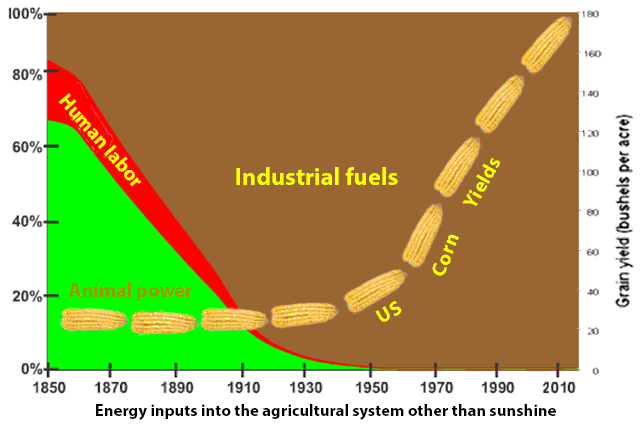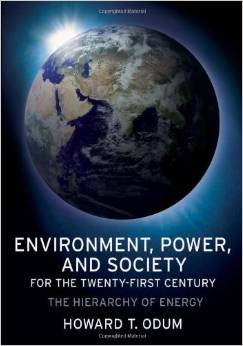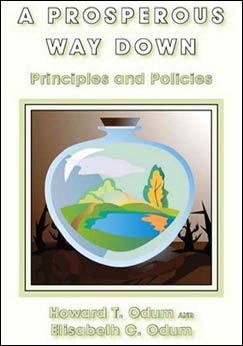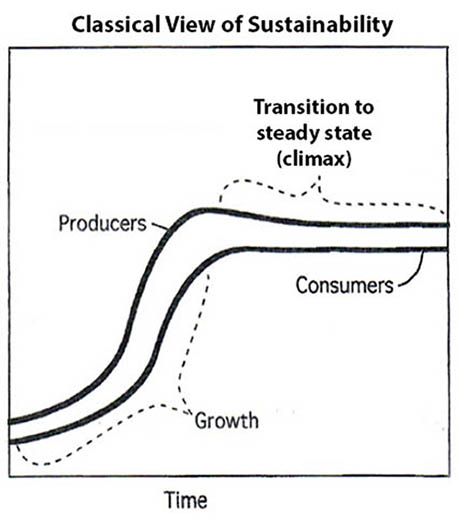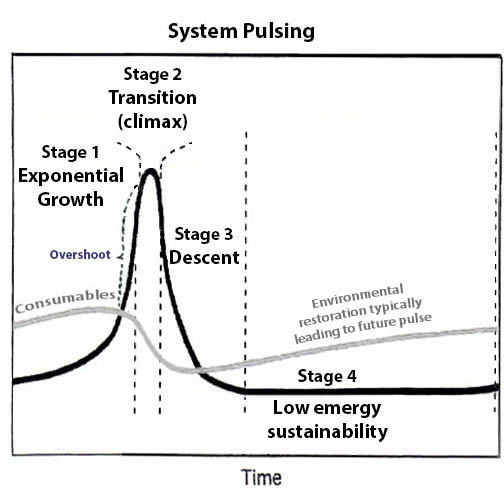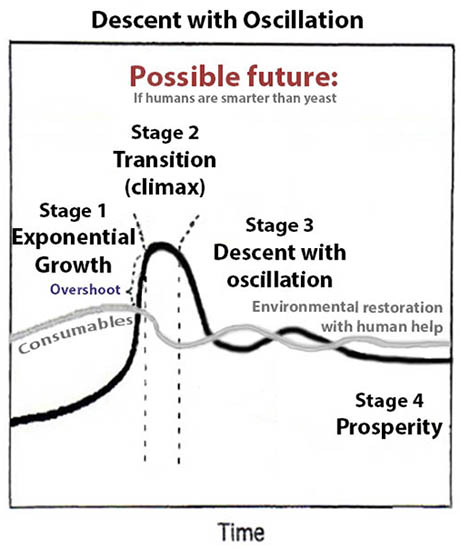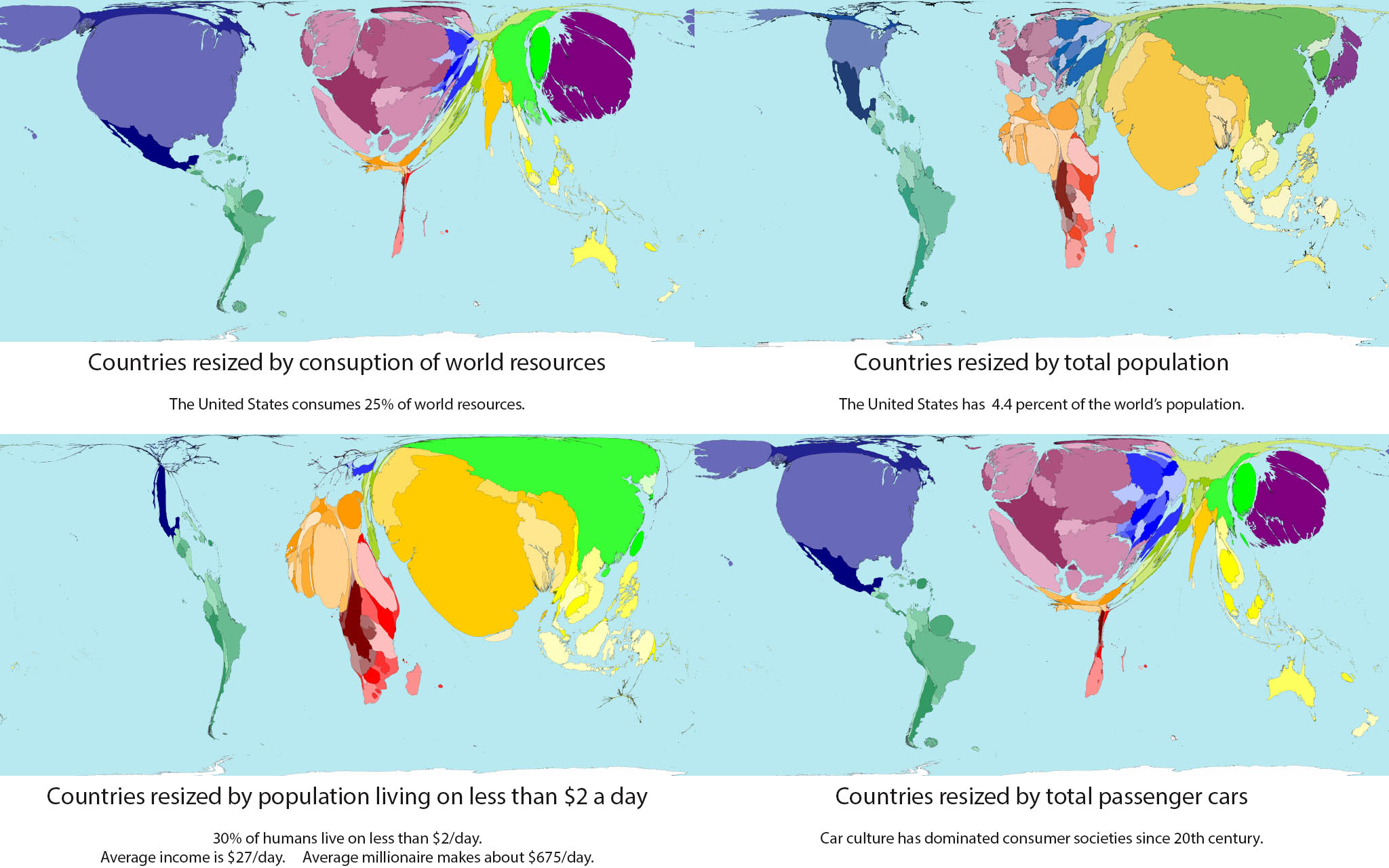
SATURDAY, March 5, 2015: NOTE TO FILE

Environment, Power, and Society for the 21st Century
Understanding basics
Eric Lee, A-SOCIATED PRESS
TOPICS: ODUM, FROM THE WIRES, PROSPEROUS WAY DOWN, REALITY-BASED
Abstract: Newton may be the quintessential silo scientist, and I've never met a silo I didn't like, but each is a dot and connecting the dots also is of value, perhaps even essential if humans are to wake up, persist as a species, and come to love and understand the system that spawned them. H.T. Odum's view through the macroscope of systems science is revelatory and transformative.
TUCSON (A-P) — Industrial society transforms energy derived from fossil fuels (oil, gas, coal), geological (nuclear, geothermal, hydro, tidal), biological storage (food, biofuels, animal power including human), and solar PV into profit driven growth. Just as agriculture allowed human populations to grow about 10 fold, the industrial use of fossil and geological energy sources has allowed another 10+ fold increase. Current industrial agriculture is a means of turning fossil fuels into food.
Food production, processing, and distribution has been largely industrialized. It takes about 10 times more energy to produce food industrially than is contained in the food. Potatoes are made mostly of petroleum transformed into more marketable products as is everything else on the menu in industrialized areas (all cities, towns, most villages—almost everywhere humans inhabit the planet). Included would be most natural, organic, non-GMO foods.
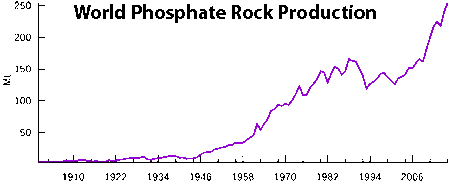 Industrial agriculture (the food you eat) is dependent on fertilizer inputs. Limited phosphorus deposits are unsustainably mined to provide this essential macronutrient (for a time) and overload Earth's ecosystems with phosphorus (as nitrogen is more so) in runoff from residential lawns, agricultural fields, and wastewater. US production of phosphate rock peaked in 1980 with world production likely to peak in the 21st century. And then what?
Industrial agriculture (the food you eat) is dependent on fertilizer inputs. Limited phosphorus deposits are unsustainably mined to provide this essential macronutrient (for a time) and overload Earth's ecosystems with phosphorus (as nitrogen is more so) in runoff from residential lawns, agricultural fields, and wastewater. US production of phosphate rock peaked in 1980 with world production likely to peak in the 21st century. And then what?
Fuels other than fossil are used, but industrial society (life as we know it) is fundamentally dependent on fossil fuel. Fossil fuels have been used to construct dams that generate electric power, but no dams have been constructed using hydroelectric power. Fossil fuels have been used to construct nuclear power plants that generate electric power, but nuclear power has never been used to create nuclear power plants. Fossil fuels have been used to make solar PV panels.... The Romans had industrially produced glass, metals, lime, cement, and ash to fertilize crops (for a time), but only by deforesting the Mediterranean which has yet to recover. The Roman Empire prospered for a time. The Fertile Crescent is no longer fertile.
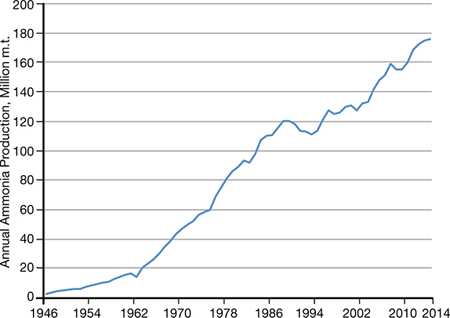 But 78 percent of air is nitrogen, so we'll never run out of nitrogen fertilizer, right? At least there are no limits to nitrogen. Well, plants absorb nitrogen from the soil in the form of nitrate (NO3−) and ammonium (NH4+) ions. All industrial nitrogen fertilizers are or are made from ammonia which is made by the Haber-Bosch Process that turns atmospheric nitrogen into ammonia. Many humans get the impression that clever apes (e.g. Haber, Bosch) performed a miracle and figured out how to save the world from the pending shortage of nitrogen fertilizer that was mined (for a time) from bat and bird guano. There had been talk of 'peak guano' and nay-saying doomers were predicting the collapse of civilization. But human ingenuity, as it always has and will, saved us so we could keep on growing. This narrative of human dominion, exceptionalism, and 'decoupling' from nature (red in tooth and claw), is delusional. Clever apes enabled atmospheric nitrogen to be turned into ammonia from fossil fuel (natural gas) using fossil fuels (oil, coal, natural gas). The Haber Process is another way of turning fossil fuels into food. Clever apes use vast amounts in many ways to increase agricultural production (for a time).
But 78 percent of air is nitrogen, so we'll never run out of nitrogen fertilizer, right? At least there are no limits to nitrogen. Well, plants absorb nitrogen from the soil in the form of nitrate (NO3−) and ammonium (NH4+) ions. All industrial nitrogen fertilizers are or are made from ammonia which is made by the Haber-Bosch Process that turns atmospheric nitrogen into ammonia. Many humans get the impression that clever apes (e.g. Haber, Bosch) performed a miracle and figured out how to save the world from the pending shortage of nitrogen fertilizer that was mined (for a time) from bat and bird guano. There had been talk of 'peak guano' and nay-saying doomers were predicting the collapse of civilization. But human ingenuity, as it always has and will, saved us so we could keep on growing. This narrative of human dominion, exceptionalism, and 'decoupling' from nature (red in tooth and claw), is delusional. Clever apes enabled atmospheric nitrogen to be turned into ammonia from fossil fuel (natural gas) using fossil fuels (oil, coal, natural gas). The Haber Process is another way of turning fossil fuels into food. Clever apes use vast amounts in many ways to increase agricultural production (for a time).
Solar power is not used to make solar panels (mostly cheap coal in China is) and while solar proponents committed to overselling solar claim that a solar powered society could produce much more power than needed to replace the solar panels, distribution system, storage, the transformation (DC/AC) devices as they wore out, and support the needs and wants of all involved in creating and maintaining the system (mining, transportation, manufacture, distribution, support, operation, infrastructure, management, maintenance...). There is no evidence that solar PV can replace fossil fuels on the scale fossil (temporarily) provides.
It is possible that solar could have a net negative energy output, meaning that if what is left of fossil fuels were used to create solar power generators, but they could not produce enough power to maintain and replace the system, then the solar society would collapse. At best the technology of solar may evolve to have a positive net emergy output (maybe 2:1) such that some useful work can be done over and above keeping the solar power production system producing enough energy to replace itself. The power available to a sustainable solar society would be the net energy produced which will be a fraction of the power (maybe one third to one fifth) unsustainable fossil fuels and nuclear power currently provide.
All fossil fuel alternatives are heavily
subsidized by fossil fuels which are in effect being
used to transform oil/coal/gas into energy producing
machines (dams, nuclear power, wind generators, solar
panels) that may or may not produce much more energy than
embodied in them. Alternative energy is subsidized (about
$120 billion/year), but fossil fuels are more subsidized by about $5.3 trillion/year
or $10 million dollars a minute, which is a trivial amount if the
cost
of premature illness, lost productivity and death secondary to pollution is added along with the much greater costs secondary to
activity
intolerance induced by dependence on high-power transportation
(cars), movement saving (labor saving) devices, and cost of climate
change is factored in as any
reality-based accounting would. All this for no reason other than it
profits the few in the short term. That our grandchildren may not have a
tolerable planet
to live on is irrelevant to the bottom line. Foresight intelligence is alternative.
More fossil fuel is used by industrial agriculture to produce crops and convert them into biofuels than energy contained in the fuels. So ethanol is made of oil transformed by a complex, unsustainable, subsidized, and therefore profitable system that is utterly dependent on fossil fuels. It produces 24% more carbon than just gurning gasoline does. If ethanol or hydrogen had to be used to power farm machinery, make machinery, make fertilizer, pump water, harvest, transport materials, and build and run ethanol or electrolysis plants, then the system wouldn't be able to produce net energy.
Hydrogen fuel would be non-polluting if solar power is used to produce it and solar is used to produce the solar power system, but more solar power would be needed to produce hydrogen than is contained in it, so if at all possible use solar electric directly instead. In some areas hydroelectric, wind, geothermal, and tidal power can produce more energy than would be needed to maintain energy production, but only in places. Given all the potential demands, the amount available for any one use will seem severely limited by today's fossil-fueled standards.
The only widely distributed power source is solar—1 to 7 sun hours per day average depending on location. Living plant with chlorophyll have been the primary producers supporting life on Earth for hundreds of millions of years, and they require solar. To preserve merely some vestige of our information technology, which is dependent on electricity, by using some portion of the planet for solar electric production should be a priority. Lesser uses, such as for refrigeration or transportation, are secondary. To produce enough net solar power to replace existing fossil fuel uses, let alone fuel continued growth, is not possible.
The "not possible" has a physical basis which requires a grounding in systems ecology to understand. A clue can be offered by analogy, by telling an allegorical story. Imagine you win the Mega Global Lottery. You win 43.2 trillion dollars. Life would seem good, perhaps deliriously off-the-scale wonderful for a time, assuming you avoided early death by excess and other downsides to wealth. You couldn't spend it all in a day, but with determination the rate of spending would plot out as an exponential curve. For months, years, and decades life would be on the up and up.
You would die in luxury, burdening your descendants with the task of spending it all, and they would work tirelessly doing so. Their seeming challenge would be to burn through the money fast enough. Spending it all would seem impossible. The continuance of life as your great grandchildren knew it would depend on a high rate of spending, so habituated would they be to wealth.
At some point someone who understood that the spending spree was unsustainable would mention the fact. The problem then, after peak spending, would be to transition to a sustainable income by investing in ways and means to generate a small but sustainable income that would allow some spending to continue for your ever growing number of descendants. At best the sustainable income would allow for spending money at a small fraction of the rate of earlier spending.
So conditioned to high spending would your descendants be that they would likely delay transitioning until it was too late. They would easily be oversold on sustainable spending products and schemes promising a "vision for building a bright sustainable future" that would preserve or enhance their quality of life during the transition to come. However, their spending empire would still collapse. Survivors, such as there may be, would likely not live as well as you did before winning your trillions. You may have lived the putative good life, but so what?
Fossil fuels were an immense, almost unimaginably huge (to the recently clothed naked apes) inheritance hundreds of millions of years in the making. Learning to exploit it allowed industrial society to continue to grow after the wood and whale oil ceased to fuel growth. Were it not for the low hanging fruit of easy coal/oil, industrial society would have likely have collapsed in the 19th century, perhaps early 20th century. Compared to all the wood and whale oil on the planet, fossil fuel was like inheriting several trillion dollars compared to living on the minimum wage. When the trillions of dollars have been spent, living on a minimum wage will seem like wonderful good fortune compared to no wage at all.
The best outcome is to spend some of the remaining fossil fuel to lay the foundations of an alternatively lower powered civilization that can provide a minimum living wage/energy for those who survive the transition. Most of the fossil fuel left needs to stay in the ground unburned.
A solar electric powered society could (maybe) be sustainable. Using solar to build a solar PV powered civilization would be slow, tough going, if doing so is possible at all. Using fossil fuels to build the infrastructure whose solar energy output could maintain the system (at least the IT part of it) and produce net energy for other uses would greatly ease the transition to a living wage, which will in no way resemble the profligate spending of the fossil-fueled ones. Those whose lives have been committed to spending and consuming (and making the money to do both) may end up with no wages to live on. On their way down, former industrial workers/consumers may take the elites with them.
The overselling of alternative energy is nothing less
than a criminal enterprise. To understand why, consider
reading Environment,
Power, and Society for the Twenty-First Century by Howard T. Odum or
a review as a starting point, as a primer in systems
ecology. In 1974 Odum wrote and article, Energy, Ecology, & Economy, which is also a shorter starting point and free, quicker read. For those for whom science is not a primary or
second language, consider A
Prosperous Way Down: Principles and Policies.
It may be
fundamentally about 'the economy, stupid' or the attention economy, but the real
economy is not about money, it is about the flow of energy
and materials in living systems.
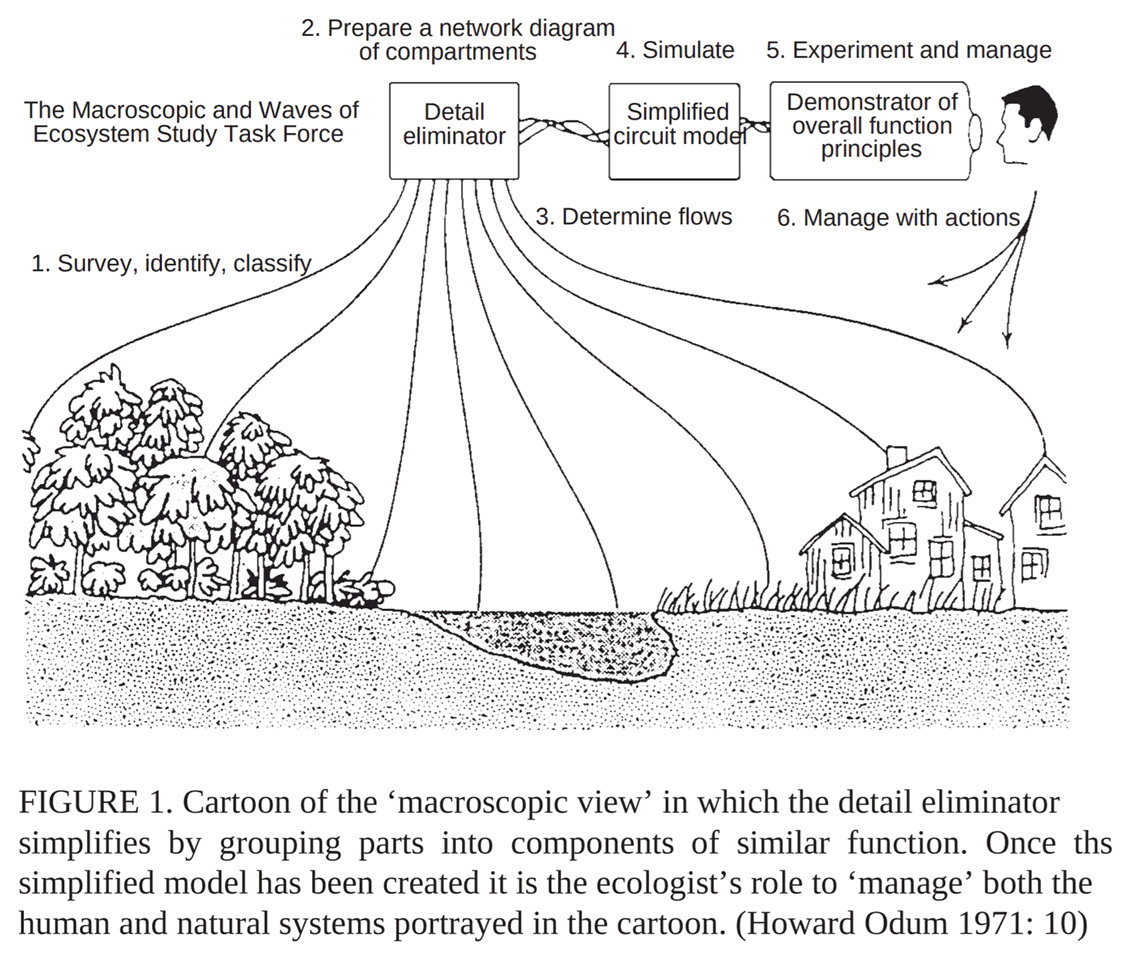
For those on a reading-lite diet or tight budget, start by taking a look in the macroscope. Avoid being like those who refused to look through Galileo's telescope. Most of the offerings on the Prosperous Way Down site merit reading. Consider right clicking on each link as you read to open in a separate window, then when finished reading an article/post, check out the links. Try it now by going to the start of this page and right click on the links. No need to go into debt to get an education. For an easy listening intro to Reality 101, consider watching the first 11 minutes of this TEDx talk:
This is the feel-good version. Omitted is that "sustainable" means "lessable." Intentionally transitioning to a sustainable, simpler way of life (smaller population consuming less), which is the prosperous way down to living simply, is alternative to being beaten down and forced to consume less (even smaller population with even less to consume post collapse).
"Down" or "less" doesn't sell well in a consumer society. Some effort is needed to follow the breadcrumbs of evidence. Most who have a clue want to sell, or fervently oversell, people on transitioning to a resilient, prosperous vision of a better life, but bottom line is our civilization will more likely than not have to downsize about 10 fold one way or another which will be much better than downsizing 100 fold.
It is natural and normal for systems to pulse. In temperate regions there is spring/summer growth, a fall/winter transition/descent, followed by restoration of favorable conditions for growth. Life adapts and prospers in the long run. The fossil fuel induced pulse humans are living in is unprecedented, and humans (now entering into the transition stage) need to adapt to descent. Denial (business-as-usual) leads to collapse (a more precipitous, chaotic descent).
Proactively accepting descent adaptively by understanding it and acting accordingly would be the prosperous way down. The classical model could be achieved only by intentionally limiting growth before overshoot to avoid collapse and allow for a much higher level of sustainability. Best guess, however, is that we are in overshoot heading "hell-bent" for climax and chaotic descent. The harder we try to avoid descent, the harder we'll fall. The sooner we embrace descent, the lesser the fall (our own and that of all life on Earth with the possible exception of cockroaches & friends) and greater the sustainable prosperity. "Economic development" is "growth" and "sustainable development" is doublethink.
When conditions allow, growth occurs, limits are pushed and exceeded, corrective feedback occurs after overshoot, carrying capacity (the gray line above) is reduced during transition, and descent is forced. Following descent (collapse), environment is past being "conserved" and must be restored either by natural recovery over time or deliberate intervention by humans (the Nature Conservancy will be renamed the Nature Restorancy).
Human history and life on Earth is a history of pulsing. If humans wish to avoid descent/collapse, they need to understand system pulsing (environment, power, society) and practice restraint/moderation to avoid overshoot. Humans are the only animal with the potential to do so. To understand something creates the potential for being delivered from it.
If humans collectively had a better grasp of reality, they might have decided perhaps in the 1970s to avoid collapse, preferring to moderate overshoot through extreme effort and embrace descent even though this did not involve the rich getting richer. Finding out at what actual level renewables could be consumed would likely involve trial and error—a learning curve. The level of consumption could very well exceed carrying capacity requiring a bit more descent. Carrying capacity will change over time geological, and local system perturbations will occur. Constant assessment of planetary and local life-support systems, to adjust the number of humans and their level of consumption, would be needed. If any group of humans anywhere at any time embraced growth for its own sake, they would have to be regarded as a cancer. Failure to treat has death/extinction as the end point. Instead of viewing Earth as a planet for the taking, adaptive humans would do better to be benefactors, to above all work to enhance environment, power, and society—and the global carrying capacity (life support system) for life on Earth.
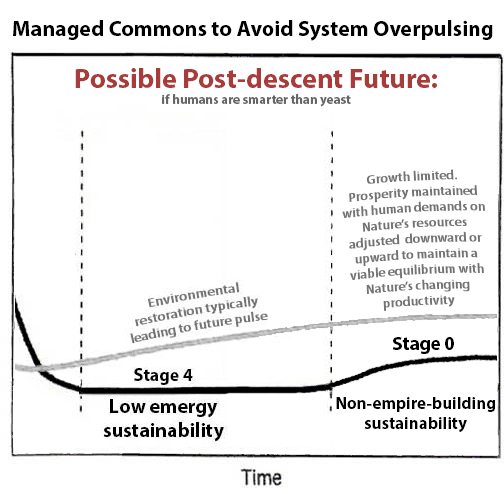
If collapse is not avoided, then it will take a bit longer to transition to sustainability. As the millennia pass, it won't matter much to posterity whether the transition was a few decades or centuries in the doing. Sooner is better, but what matters is whether we keep on repeating the pattern or not as extinction will be the outcome if after some centuries of envirnonmental restoration we keep on keeping on repeating the pattern of overpulsing unto overshoot.
Possible outcomes of current fossil fuel induced pulse:
- Mass extinction* and end of industrial growth society. - A downsized remnant human population survives to
- Mass extinction* includes extinction of humans.
repeat the pattern (reality-based historical/biological view).
- A downsized human population learns to live sustainably
by living within self-imposed limits (descent with oscillation possibility).
*Note: We of the Anthropocene are presiding over a mass extinction. The question is will it be more or less massive than the one in the late Cretaceous. There is still time to intentionally fail and let the asteroid win. If we win, then extinction (our own) will be a possible, perhaps likely, booby prize. If the above vision does not seem "cornucopian" enough, consider Envision Tucson Sustainable which is far from "doomer."
“We're in a giant car heading towards a brick wall and everyone's arguing over where they're going to sit” ―David Suzuki
I sincerely hope, for the sake of posterity, that they [humans] will be content to be stationary, long before necessity compels them to it. — J.S. Mill, Principles of Political Economy, 1848
...both environmentalists and ecologists seem unwilling to accept human ecology as a natural field of study or activism. Until human environments are incorporated into the same privileged realms of study and protection which natural systems enjoy, programmes such as agroecology must surely falter on the prejudices of their chosen constituency. — Mark Glen Madison, ‘Potatoes Made of Oil’: Eugene and Howard Odum and the Origins and Limits of American Agroecology. Odum's 'better view' is naturcentric, diametrically at odds with the prevailing humancentrism/exceptionalism/supremacy of Anthropocene enthusiasts. While dismissed, their science is not obviously wrong because SYSTEM serving academics, activists, and scientists failed to take the measure of it.
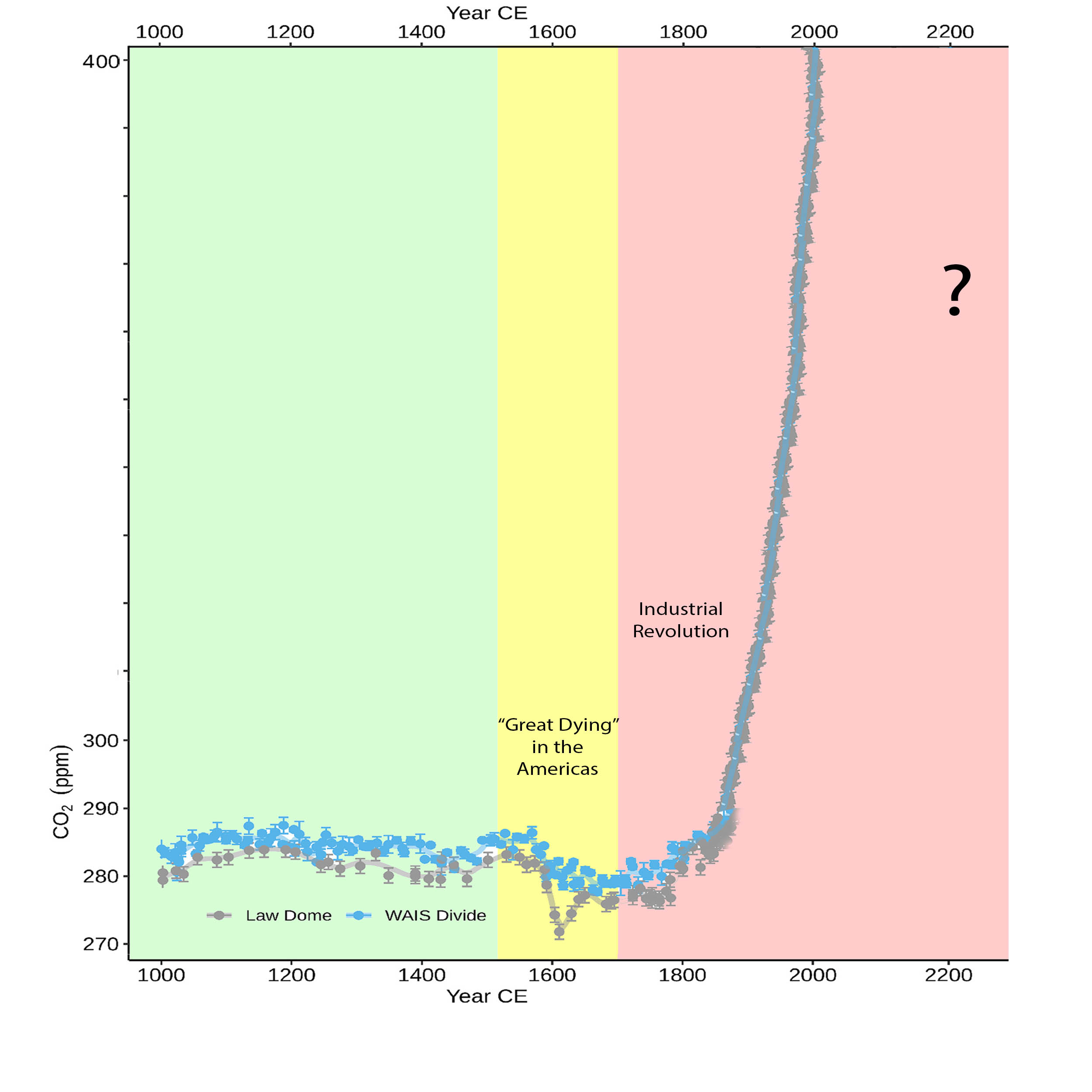
Was the Little Ice Age in the late 1500s and early 1600s, which globally lowered surface air temperatures by 0.15∘C, generated by natural forcing or a result of the large-scale depopulation of the Americas after European arrival, subsequent land use change and secondary succession? Additional uptake of CO2 into the land surface in the 1500s compared to the 1400s, accounts for 47–67% of the atmospheric CO2 decline. The Great Dying of the Indigenous Peoples of the Americas resulted in a human-driven global impact on the Earth System in the two centuries prior to the Industrial Revolution.
So did anthropogenic climate change begin in 1492? Agriculture = change in vegetation/lower CO2 uptake. Rapid human depopulation and restoring 80% of land surface to a pre-anthropocene human footprint level would mitigate rapid climate change. "Seek out the condition now that will come anyway." —Howard T. Odum
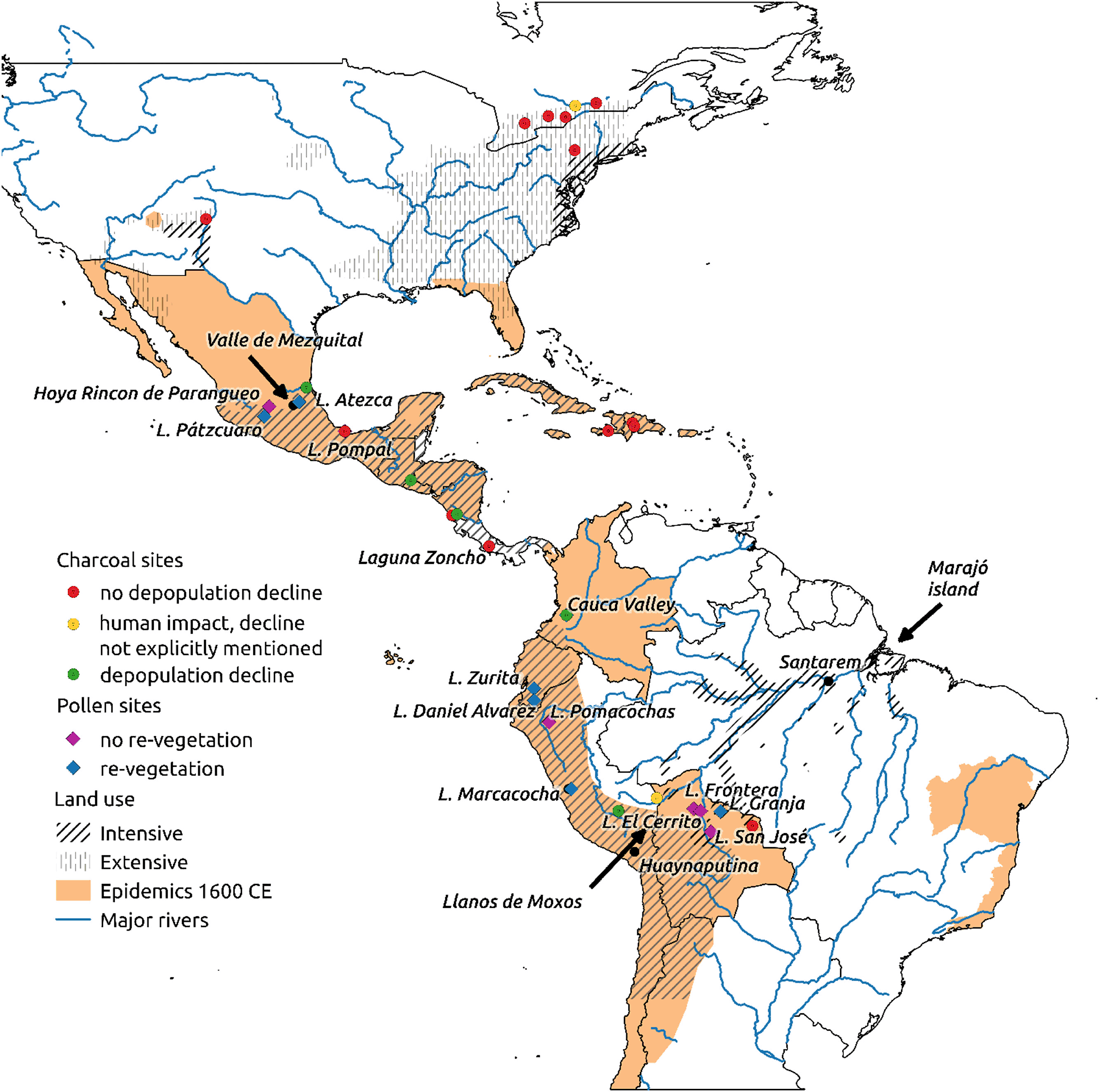
For an overview of "issues" in video format, find 35 minutes to watch:

